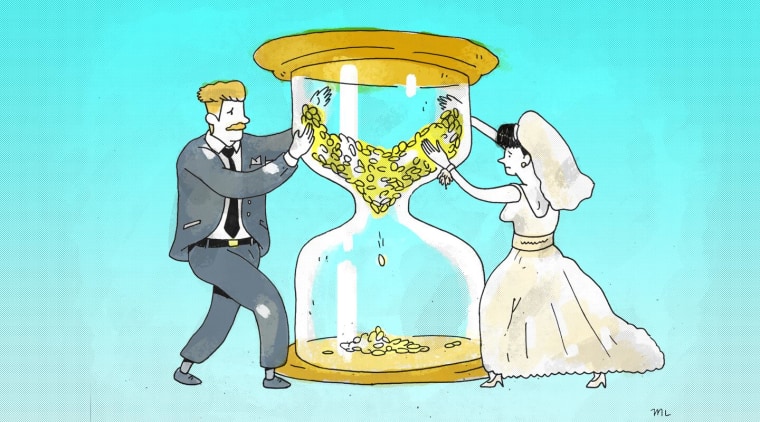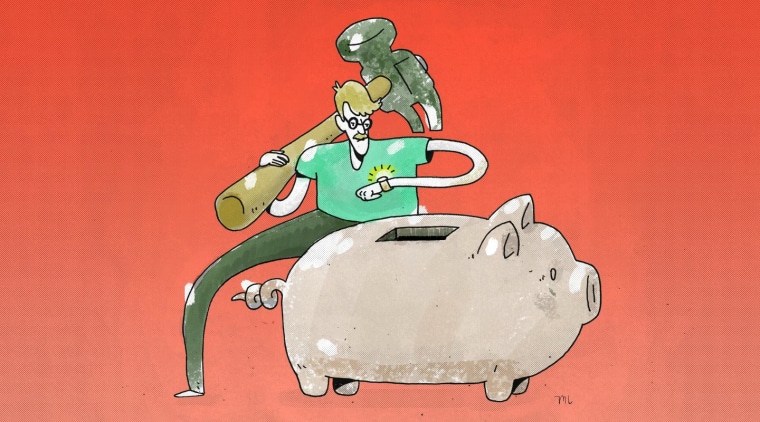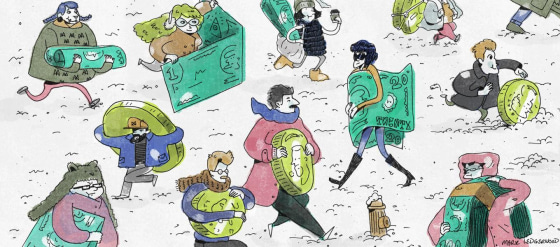A new poll of Americans' view of the national economy and their own finances has uncovered a paradox: While nearly two-thirds think the country is in a recession or going in the wrong direction, the vast majority believe their personal prospects will improve or stay the course.
A current of individual optimism — the highest level detected since 2009 — runs through the results of the NBC News/Marist Poll, despite evidence that millions of Americans, especially those in lower income brackets, are struggling to balance their budgets.
And yet that individual optimism is trumped by political pessimism of the country’s situation as a whole.
While a significant number of Americans say their current economic situation has made them change their ways, overall many seem to expect they'll eventually resume their pre-recession, high consumption ways.
One in five people have put off a major life event such as getting married or starting a family. A quarter have cut cellphone or cable services to conserve cash. Twelve percent of those questioned say their winter coat is so old it should be replaced — roughly equivalent to 29 million adults.
"There is no doubt that this poll gets at what people are experiencing in their own lives," said Lee Miringoff, director of the Marist Institute for Public Opinion.
“Although there is a sense of optimism for their personal finances — 35% expect their family finances to get better, the highest in five years — it's tempered by significant realities in terms of their own lives," he added. Among the poll's findings:
• 43% say they are saving less, compared to 36% saving more • 18% say they have postponed a life event, such as retirement, for financial reasons • 36% have delayed a big-ticket purchase like a TV or a car • 27% have curtailed cellphone, cable or other services to save money • 19% say they have less food in the fridge than they did last year • 44% are either worried or overwhelmed by how much money they owe
The hopefulness people feel at home is in stark contrast to their broader view of the nation, although that breaks down sharply along partisan lines, a phenomenon that has become more common lately.
The hopefulness people feel at home is in stark contrast to their broader view of the nation.
Asked what direction the country is going in, 63% overall say we're on the wrong path. A closer look at the numbers, though, shows the negativity is fueled by Republicans: 82% of them say the U.S. is headed the wrong way, compared to 32% of Democrats.
A similar divide was found on the question of whether Americans believe the country is still in a recession.
Although the feds declared the Great Recession ended in June 2009, six out of 10 people think it's still going on. Again, the proportion of Republicans who feel that way (72%) far outstrips Democrats (49%).
"If you have a favorable view of Obama you are less likely to think the economy is in a recession," said Barbara Carvalho, director of the Marist Poll.
Jim Barrett, 57, a father of five who lives in Cheyenne, Wyo., and custom-builds dictation equipment, is one of those who thinks the U.S. remains in the grip of recession and is not firmly on the road to recovery.
"I don't see it improving," said Barrett, who identifies himself as a Republican-leaning conservative and blames partisan bickering in Washington for a sluggish economy.
"Over the last three years, I've seen our orders go from an average of 15 a day to an average of three to five a day," he said. "When I am out and about, there are a couple of day-labor places in town, and I see larger groups of people at the door, looking for work."
And yet when asked to predict how things would go in his own life in the coming year, Barrett described himself — like 69% of those polled — as optimistic.

He said he and his wife, who stays at home to take care of her elderly parents, had stayed within means by putting off the purchase of a new car, delaying a kitchen modernization and eating out less. Industry colleagues think business will improve, but if it doesn't, Barrett is willing to look for a sideline.
"I don't want to work more, but if I have to, I will," he said.
The kind of scrimping Barrett is doing is familiar to many Americans, even though two out of three people characterize their household finances as at least somewhat strong.
The percentage of people making domestic sacrifices goes up significantly in households making less than $50,000 a year — about half the country. For instance, 27% have less food in the fridge, and 17% say they need a new winter coat.
“Although large numbers of people are struggling economically, those making below $50,000 and those in the squeeze generation – people 45 to 59 with responsibility for their children and their parents – tend in terms of making ends meet to be struggling more," Miringoff said.
Kelley Schube, 43, a former nursing home assistant from Anderson, Ind., said she and her husband, who works at a Honda plant, have been forced to make tough choices.
"We've cut down on our eating out and the type of places have changed," the mother of two said. "Before it would be Applebee's. Now we're more geared toward McDonald's. We just don't go to Red Lobster anymore.
"Instead of getting a new car, we are replacing things on my Jeep. My coat needs to be replaced, but that's something we put off this year because it was more important to make sure our kids had new jackets."
Schube, who is not working because of a disability, was pessimistic about the state of the national economy.
"The price of everything is going up. The government owes everybody and we have this huge debt. It just seems endless," she said.
But like Barrett, she thinks things are looking up for her bottom line. "We've gotten some debt paid down," she said. "And we're looking to pay down more so we won't have that hanging over our head next year."

Oklahoma firefighter Zachary Thomas, 29, is engaged but has not tied the knot because he doesn't want to start a family until he is making at least $40,000 a year.
He said he dipped into his saving in the last year to pay for gas and food but is confident he'll be in the black in the coming year — with or without Washington's help.
"I'm going to get another job on top of what I already do," he said. "I'd like to be working at least 80 hours a week."
Misty McDavitt, 33, a stay-at-home mother of six from Wichita, Kan., hasn't needed to pinch pennies and feels optimistic about her future, in large part because her husband has a stable job as an in-demand software engineer.
But the registered Republican told the pollsters she thinks the economy is in the tank and the nation is off-track because of what she sees outside her home.
Some of those interviewed expressed faith in self-reliance: If inflation and unemployment persists, they will find a way to earn more.
"It seems like in the news, there are all these reports of people on food stamps and difficulties with the health-care system," she said. "I have relatives who would like to be on food stamps."
The pollsters said it is not unusual for Americans to feel better about their future than the country's as a whole.
Some of those interviewed expressed faith in self-reliance: If inflation and unemployment persists, they will find a way to earn more.
Others, like Jennifer Horton — who has three children at home in Boise, Idaho, and relies on food stamps to augment her husband's $14-an-hour salary — find it harder to explain why they aren't dreading the future.
In Horton's words, "I guess it can't get worse, right?"
The national telephone survey of 1,200 adults was conducted Jan. 12-14. It has a margin of error of 2.8 percentage points.
